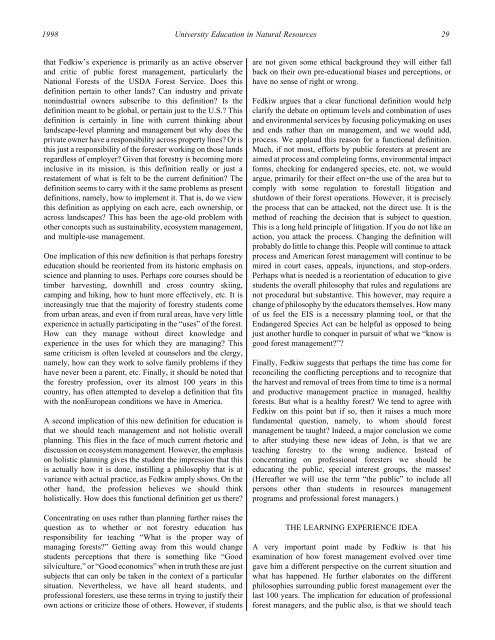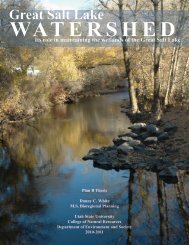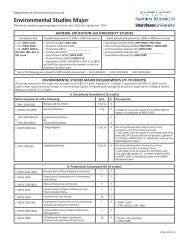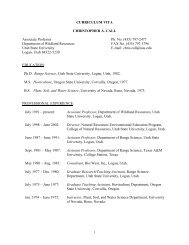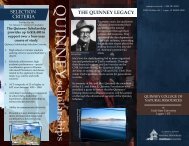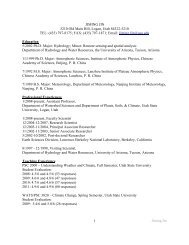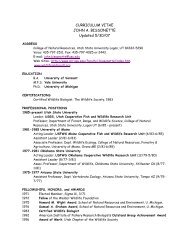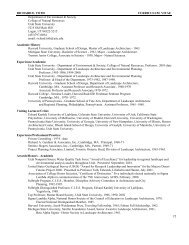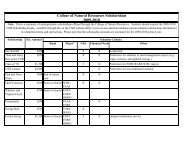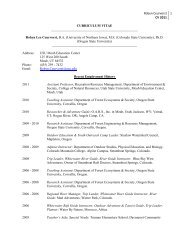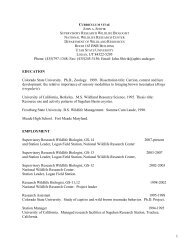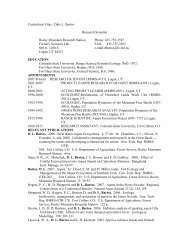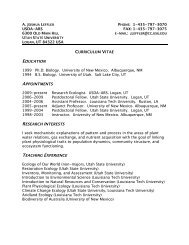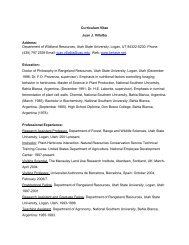University Education in Natural Resources - CNR Home - Utah State ...
University Education in Natural Resources - CNR Home - Utah State ...
University Education in Natural Resources - CNR Home - Utah State ...
You also want an ePaper? Increase the reach of your titles
YUMPU automatically turns print PDFs into web optimized ePapers that Google loves.
1998<br />
<strong>University</strong> <strong>Education</strong> <strong>in</strong> <strong>Natural</strong> <strong>Resources</strong> 29<br />
that Fedkiw’s experience is primarily as an active observer<br />
and critic of public forest management, particularly the<br />
National Forests of the USDA Forest Service. Does this<br />
def<strong>in</strong>ition perta<strong>in</strong> to other lands? Can <strong>in</strong>dustry and private<br />
non<strong>in</strong>dustrial owners subscribe to this def<strong>in</strong>ition? Is the<br />
def<strong>in</strong>ition meant to be global, or perta<strong>in</strong> just to the U.S.? This<br />
def<strong>in</strong>ition is certa<strong>in</strong>ly <strong>in</strong> l<strong>in</strong>e with current th<strong>in</strong>k<strong>in</strong>g about<br />
landscape-level plann<strong>in</strong>g and management but why does the<br />
private owner have a responsibility across property l<strong>in</strong>es? Or is<br />
this just a responsibility of the forester work<strong>in</strong>g on those lands<br />
regardless of employer? Given that forestry is becom<strong>in</strong>g more<br />
<strong>in</strong>clusive <strong>in</strong> its mission, is this def<strong>in</strong>ition really or just a<br />
restatement of what is felt to be the current def<strong>in</strong>ition? The<br />
def<strong>in</strong>ition seems to carry with it the same problems as present<br />
def<strong>in</strong>itions, namely, how to implement it. That is, do we view<br />
this def<strong>in</strong>ition as apply<strong>in</strong>g on each acre, each ownership, or<br />
across landscapes? This has been the age-old problem with<br />
other concepts such as susta<strong>in</strong>ability, ecosystem management,<br />
and multiple-use management.<br />
One implication of this new def<strong>in</strong>ition is that perhaps forestry<br />
education should be reoriented from its historic emphasis on<br />
science and plann<strong>in</strong>g to uses. Perhaps core courses should be<br />
timber harvest<strong>in</strong>g, downhill and cross country ski<strong>in</strong>g,<br />
camp<strong>in</strong>g and hik<strong>in</strong>g, how to hunt more effectively, etc. It is<br />
<strong>in</strong>creas<strong>in</strong>gly true that the majority of forestry students come<br />
from urban areas, and even if from rural areas, have very little<br />
experience <strong>in</strong> actually participat<strong>in</strong>g <strong>in</strong> the “uses” of the forest.<br />
How can they manage without direct knowledge and<br />
experience <strong>in</strong> the uses for which they are manag<strong>in</strong>g? This<br />
same criticism is often leveled at counselors and the clergy,<br />
namely, how can they work to solve family problems if they<br />
have never been a parent, etc. F<strong>in</strong>ally, it should be noted that<br />
the forestry profession, over its almost 100 years <strong>in</strong> this<br />
country, has often attempted to develop a def<strong>in</strong>ition that fits<br />
with the nonEuropean conditions we have <strong>in</strong> America.<br />
A second implication of this new def<strong>in</strong>ition for education is<br />
that we should teach management and not holistic overall<br />
plann<strong>in</strong>g. This flies <strong>in</strong> the face of much current rhetoric and<br />
discussion on ecosystem management. However, the emphasis<br />
on holistic plann<strong>in</strong>g gives the student the impression that this<br />
is actually how it is done, <strong>in</strong>still<strong>in</strong>g a philosophy that is at<br />
variance with actual practice, as Fedkiw amply shows. On the<br />
other hand, the profession believes we should th<strong>in</strong>k<br />
holistically. How does this functional def<strong>in</strong>ition get us there?<br />
Concentrat<strong>in</strong>g on uses rather than plann<strong>in</strong>g further raises the<br />
question as to whether or not forestry education has<br />
responsibility for teach<strong>in</strong>g “What is the proper way of<br />
manag<strong>in</strong>g forests?” Gett<strong>in</strong>g away from this would change<br />
students perceptions that there is someth<strong>in</strong>g like “Good<br />
silviculture,” or “Good economics” when <strong>in</strong> truth these are just<br />
subjects that can only be taken <strong>in</strong> the context of a particular<br />
situation. Nevertheless, we have all heard students, and<br />
professional foresters, use these terms <strong>in</strong> try<strong>in</strong>g to justify their<br />
own actions or criticize those of others. However, if students<br />
are not given some ethical background they will either fall<br />
back on their own pre-educational biases and perceptions, or<br />
have no sense of right or wrong.<br />
Fedkiw argues that a clear functional def<strong>in</strong>ition would help<br />
clarify the debate on optimum levels and comb<strong>in</strong>ation of uses<br />
and environmental services by focus<strong>in</strong>g policymak<strong>in</strong>g on uses<br />
and ends rather than on management, and we would add,<br />
process. We applaud this reason for a functional def<strong>in</strong>ition.<br />
Much, if not most, efforts by public foresters at present are<br />
aimed at process and complet<strong>in</strong>g forms, environmental impact<br />
forms, check<strong>in</strong>g for endangered species, etc. not, we would<br />
argue, primarily for their effect on~the use of the area but to<br />
comply with some regulation to forestall litigation and<br />
shutdown of their forest operations. However, it is precisely<br />
the process that can be attacked, not the direct use. It is the<br />
method of reach<strong>in</strong>g the decision that is subject to question.<br />
This is a long held pr<strong>in</strong>ciple of litigation. If you do not like an<br />
action, you attack the process. Chang<strong>in</strong>g the def<strong>in</strong>ition will<br />
probably do little to change this. People will cont<strong>in</strong>ue to attack<br />
process and American forest management will cont<strong>in</strong>ue to be<br />
mired <strong>in</strong> court cases, appeals, <strong>in</strong>junctions, and stop-orders.<br />
Perhaps what is needed is a reorientation of education to give<br />
students the overall philosophy that rules and regulations are<br />
not procedural but substantive. This however, may require a<br />
change of philosophy by the educators themselves. How many<br />
of us feel the EIS is a necessary plann<strong>in</strong>g tool, or that the<br />
Endangered Species Act can be helpful as opposed to be<strong>in</strong>g<br />
just another hurdle to conquer <strong>in</strong> pursuit of what we “know is<br />
good forest management?”?<br />
F<strong>in</strong>ally, Fedkiw suggests that perhaps the time has come for<br />
reconcil<strong>in</strong>g the conflict<strong>in</strong>g perceptions and to recognize that<br />
the harvest and removal of trees from time to time is a normal<br />
and productive management practice <strong>in</strong> managed, healthy<br />
forests. But what is a healthy forest? We tend to agree with<br />
Fedkiw on this po<strong>in</strong>t but if so, then it raises a much more<br />
fundamental question, namely, to whom should forest<br />
management be taught? Indeed, a major conclusion we come<br />
to after study<strong>in</strong>g these new ideas of John, is that we are<br />
teach<strong>in</strong>g forestry to the wrong audience. Instead of<br />
concentrat<strong>in</strong>g on professional foresters we should be<br />
educat<strong>in</strong>g the public, special <strong>in</strong>terest groups, the masses!<br />
(Hereafter we will use the term “the public” to <strong>in</strong>clude all<br />
persons other than students <strong>in</strong> resources management<br />
programs and professional forest managers.)<br />
THE LEARNING EXPERIENCE IDEA<br />
A very important po<strong>in</strong>t made by Fedkiw is that his<br />
exam<strong>in</strong>ation of how forest management evolved over time<br />
gave him a different perspective on the current situation and<br />
what has happened. He further elaborates on the different<br />
philosophies surround<strong>in</strong>g public forest management over the<br />
last 100 years. The implication for education of professional<br />
forest managers, and the public also, is that we should teach


